Premium Only Content
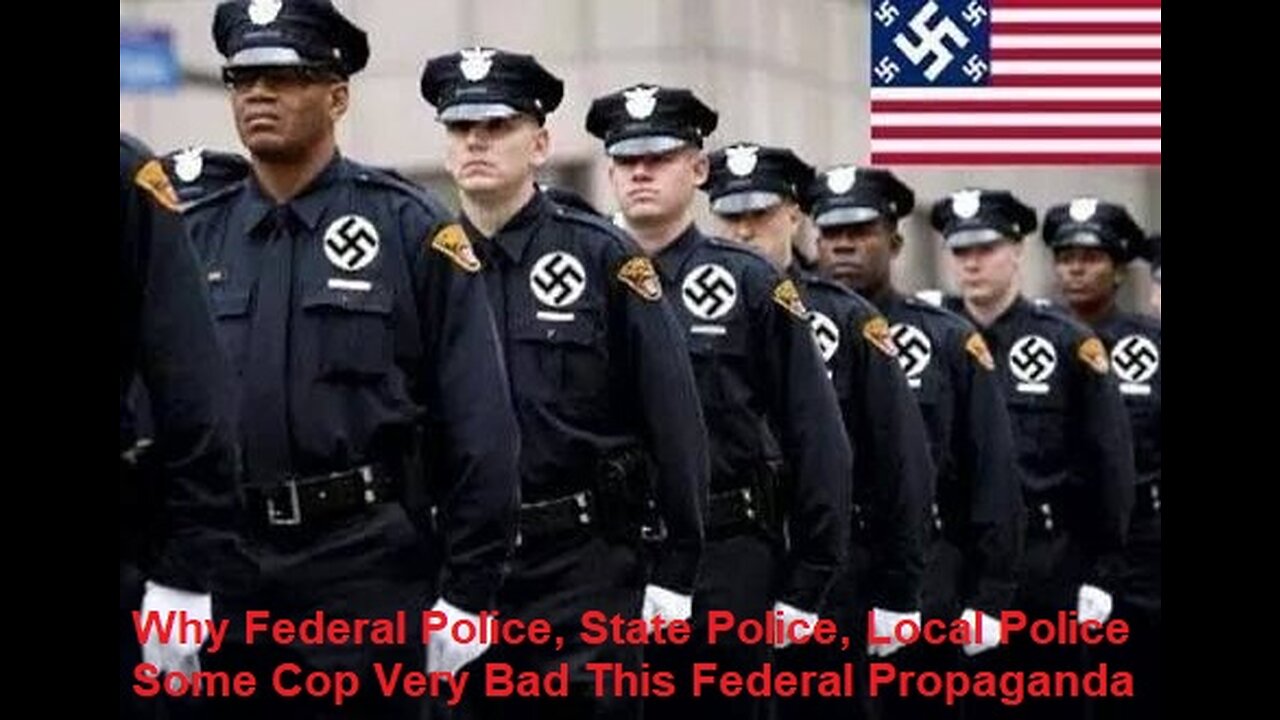
Why Federal Police, State Police, Local Police Some Are Bad This Federal Propaganda
Why Are Police In The USA So Terrified? What’s the difference between Federal Police, State Police, and Local Police? This video will answer that question for you! There are several differences and similarities between Federal, State, and Local police. The way the United States does law enforcement is quite unique, and can be confusing the deeper you look into it. While you may see some uniformity on the Federal level, you won’t see as much of that compared to Local police. And by local police, we mean Town, City, and County police.
In a recent incident in the United States, yet another unarmed man was shot dead by police after opening his front door in response to their knock. The police were going to serve an arrest warrant on a domestic violence suspect – the man’s neighbour – but went to the wrong address. See ‘Police kill innocent man while serving warrant at wrong address’ .
For those who follow news in the United States, the routine killing of innocent civilians by the police has become a national crisis despite concerted attempts by political and legal authorities and the corporate media to obscure what is happening. See ‘Killed by Police’ and ‘The Counted: People killed by police in the US’.
So far this year, US police have killed 1,044 people. In contrast, from 1990 to 2016, police in England and Wales killed just 62 people. See ‘Fatal police shootings’.
Of course, these murders by the police are just the tip of the iceberg of police violence as police continue to demonstrate that the freedoms ‘guaranteed’ by the Fourth Amendment have been eviscerated. See ‘What Country Is This? Forced Blood Draws, Cavity Searches and Colonoscopies’ .
So why are the police so violent? you might ask. Well, several scholars have offered answers to this question and you can read a little about what they say in these articles reviewing recent books on the subject. See ‘The Fraternal Order of Police Must Go’ and ‘Our Ever-Deadlier Police State’ .
While there is much in these works with which I agree – such as the racism in US policing and the corruption of the legal system which is used to violently manage oppressed peoples in the name of ‘justice’ while leaving the individuals, banks and corporations on Wall Street unaccountable for their endless, ongoing and grotesque crimes against society, the economy and the environment – I would like to pose a deeper question: Why are police in the USA so terrified? This is the important question because only people who are terrified resort to violence, even in the context of policing. Let me explain why this is the case and how it has occurred in the police context in the USA.
Violence does not arise ‘out of nowhere’. And, sadly, its origin can be traced to what is euphemistically called the ‘socialization’ of children but which is more accurately labeled ‘terrorization’. You might think that this sounds extreme but if you spend some time considering the phenomenal violence – ‘visible’, ‘invisible’ and ‘utterly invisible’ – that we adults inflict on children during the ordinary course of the day – see ‘ Why Violence? ’ and ‘ Fearless Psychology and Fearful Psychology: Principles and Practice ’ – while deluding ourselves that we are preparing them to become just, decent and powerful citizens, then you might be willing to reconsider your concept of what it means to nurture children. Tragically, we are so far from any meaningful understanding of this notion, that it is not even possible to generate a widespread social discussion about how we might go about it.
So, having terrorized children into submission so that they unthinkingly and passively accept their preordained role in life – to act as a cog in a giant and destructive enterprise which they are terrorized into not questioning and over which they have no control – each of them takes their place in the global ‘economy’ wherever they can find a set of tasks that feels least painful. The idea of seeking their true path in order to search out their own unique destiny never even occurs to most of them and so they lead ‘shadow lives’ endlessly suppressing their awareness of the life that might have been.
Some of these individuals end up as recruits at a police training facility, where they are further terrorized into believing an elite-sponsored ideology that precludes genuine appreciation of the diversity of people in the community they will later police (that is, terrorize) in the name of ‘law and order’. After all, elite social control is more readily maintained when people, including the police, live in fear.
Police training further terrorizes the individuals involved and militarizes policing by encouraging recruits ‘to adopt a “warrior” mentality and think of the people they are supposed to serve as enemies’; the equipment they use, such as battering rams, flashbang grenades and Armored Personnel Carriers, evoke a sense of war. See ‘War Comes Home: The Excessive Militarization of American Policing’.
But it doesn’t end with terrorization during childhood and then police training. Police practice functions within a long-standing cultural framework which has both wider social dimensions and narrower, localized ones. And this cultural framework has been changing, more quickly in recent years too. Unfortunately, more than ever before, this framework is increasingly driven by fear and older, delusional social expectations that police are there to maintain public safety or defend the community from criminal violence have given way to militarized assumptions, language and procedures that regard virtually everyone (and certainly indigenous people and people of color) as both dangerous and guilty until proven otherwise and treat the family home and car as targets to be ‘neutralized’ with military-style tactics and weapons. And this trend has been accelerated under Donald Trump. See ‘Trump to lift military gear ban for local police’ .
By triggering fear and using military-style tactics and weapons, however, the very essence of the relationship between police and civilians is more rapidly, completely and detrimentally transformed in accord with elite interests. It equates law-enforcement with counter-terrorism and community safety with social control.
Fundamentally, of course, this plays its part in ensuring minimal effective resistance to the broader elite agenda to secure militarized control of the world’s populations and resources for elite benefit.
This transformation in the relationship between police and civilians has been accelerated by training US police in the use of military tactics that the Israeli military employs against the occupied Palestinians. See ‘Israel trains US law-enforcement in counter-terrorism’ .
But consider the implications of this.
As Rashid Khalidi, the Edward Said professor of modern Arab studies at Columbia University, has noted in discussing this phenomenon: US police are learning paramilitary and counterinsurgency tactics from the Israeli military, border patrol and intelligence services, which enforce military law.
If American police and sheriffs consider they’re in occupation of neighborhoods like Ferguson and East Harlem, this training is extremely appropriate – they’re learning how to suppress a people, deny their rights and use force to hold down a subject population’. See ‘US Police Get Antiterror Training In Israel’ .
Moreover, the most tangible evidence that the militarized training is having an impact on US policing is that both Israel and the US are using identical equipment against demonstrators, according to a 2013 report by the Israeli human rights organization B’Tselem and photographs of such equipment taken at three demonstrations in the USA. ‘Tear gas grenades, “triple chaser” gas canisters and stun grenades made by the American companies Combined Systems Inc. and Defense Technology Corp. were used in all three U.S. incidents, as well as by Israeli security forces and military units.’ See ‘US Police Get Antiterror Training In Israel’ .
Given the sheer terror that drives Israeli military policy towards occupied and militarily undefended Palestine, it is little wonder that this fear is transmitted as part of any training of US police. All knowledge and technology is embedded with emotion, and fear is utterly pervasive in any military activity. Especially when it is directed in defense of unjust ends.
So what can we do?
If you are interested in working to reduce police fear and violence, you will get plenty of ideas in the document ‘A Toolkit for Promoting Justice In Policing’ which is summarized here: ‘15 Things Your City Can Do Right Now to End Police Brutality’ .
If you want to organise a nonviolent action while reducing police fear to minimize the risk of police violence, there is a comprehehensive list of guidelines here: ‘Nonviolent Action: Minimizing the Risk of Violent Repression’ .
If you want to work towards ending the underlying fear that drives police (and other) violence, consider making ‘My Promise to Children’ . In essence, if you want powerful individuals who are capable of resisting elite social control, including that implemented through police violence, then don’t expect children terrorized into obedience by parents, teachers and religious figures to later magically have this power.
And if you are inclined to resist violence in other contexts, consider participating in ‘ The Flame Tree Project to Save Life on Earth ’ , signing the online pledge of ‘ The People ’ s Charter to Create a Nonviolent World ’ and/or using the strategic framework explained in Nonviolent Campaign Strategy for your peace, environmental or social justice campaign.
Why are the police so terrified? Essentially because they were terrorized as children and then terrorized during police training to violently defend elite interests against the rest of us. Elite control depends on us being too terrified to defend ourselves against their violence.
If humans are to survive this elite-driven onslaught, we need people courageous enough to resist police violence and other elite-driven violence strategically. Can we count on you?
GOP Judges More Unfair In Sentencing Than Dem. Judges ?
I have been called a bleeding-heart liberal. That's OK. But I also worked in various aspects of law enforcement for nearly 30 years, and I believe crime should be punished (especially crimes against the safety or property of others) -- and I believe serious crimes should come with a prison sentence.
However, I also believe that when justice is meted out, it should be done fairly -- with no regard for race, ethnicity, gender, or economic status. But too often our courts do not operate that way. Some judges give Blacks harsher sentences than Whites for the same crimes -- and women are given lesser sentences than men for the same crime. This is unfair, and makes a mockery of the "equal protection" clause of the Constitution's Fourteenth Amendment.
Unfair sentencing is wrong, whether the offending judge is a Democrat or a Republican. But a new study shows that Republican Judges are more unfair in sentencing than Democratic judges -- significantly so. The study was done by Harvard Law School professors Alma Cohen and Crystal S. Yang. They studied 1,400 federal judges over a period of 15 years.
What they found was very disturbing, but not surprising. It seems that Republican judges gives Blacks harsher sentences than Whites, and they also give women lesser sentences than they give men -- all for the very same crimes. They found:
Linking approximately half a million defendants to their sentencing judges, we find that Republican-appointed judges sentence black defendants to longer prison terms than non-black defendants compared to Democratic-appointed judges.
Republican-appointed judges also sentence female defendants to shorter prison terms than males compared to Democratic-appointed judges.
These racial and gender disparities by political affiliation emerge at both the fact-finding and sentencing stages of the criminal justice process, and are robust to controlling for other judge and court characteristics, such as judge race, gender, and proxies for racial attitudes.
We also find that differences in disparities by political affiliation, particularly racial gaps in sentence length, expand when judges were given more discretion after the mandatory Guidelines were rendered advisory. Moreover, these enlarged differences cannot be solely explained by differences in the willingness of Republican-appointed and Democratic-appointed judges to depart from the Guidelines. These results suggest that a consequence of the advisory Guidelines system is an expansion of sentencing disparities by judge political affiliation.
Republican and Democratic-appointed judges treat defendants differently on the basis of their race and gender given that we observe robust disparities despite the random assignment of cases to judges within the same court. Our results also indicate that these disparities are not solely due to differences in the treatment of certain offense types by judge political affiliation as we find large racial and gender gaps even within specific crimes such as drug offenses. More speculatively, our results are consistent with some judges holding discriminatory attitudes given that we find larger disparities among judges who serve in courts from states with higher racial bias, which are disproportionately located in the South.
Our results suggest that a judge’s political ideology may affect how he or she views the dangerousness or blameworthiness of different defendants by race and gender.
According to our findings, racial disparities in sentencing would be almost halved if federal district courts were comprised of all Democratic-appointed judges, and reduced by more than five percent if courts were comprised of ten percent more judges appointed by Democratic presidents. In recent decades, the typical president has appointed roughly 160 district court judges in a four-year term.16 Under the current composition of the federal court system, these appointments could change the partisan composition of district courts by 15 to 20 percentage points, which could substantially alter gender and racial disparities in the criminal justice system depending on the political affiliation of the appointing president. The potential to affect disparities is even larger for two-term presidents.
Unequal Justice: The U.S. Supreme Court’s Crisis of Legitimacy As the U.S. Supreme Court embarks on a new term, Justice Samuel Alito is feeling angry and hurt. The hallowed institution on which he has served since 2006 is experiencing a crisis of legitimacy not seen since the early 1930s.
The legitimacy crisis is reflected in fresh opinion polling that shows public approval of the court plunging to record lows. It has been driven by a series of rightwing rulings the court has handed down on a host of critical issues, ranging from voting rights and gerrymandering to union organizing, campaign finance and, most recently, abortion. And with conservatives enjoying a solid 6-3 advantage on the high tribunal, the crisis will likely only get worse.
Never one to nuance his extremist views, Alito put his anxieties on full display during an extraordinarily vituperative hour-long speech given on September 30 at Notre Dame University. The speech dealt with media coverage of the so-called shadow docket, and was live-streamed by the university’s Kellogg Institute of International Studies.
The “shadow docket” is a term used by academics and journalists to describe cases decided in secrecy on an expedited basis without the benefit of oral argument or full briefing. Although the court has a long history of issuing expedited decisions, such cases proliferated during the Trump presidency, and the trend is continuing in the Biden era. The court’s infamous 5-4 ruling released just before midnight on September 1, in which it declined to block Texas’s new draconian anti-abortion law, is but one of many examples.
Alito explained that he prefers the term “emergency docket” and offered a spirited defense of the court’s work and practices. From there, however, his speech degenerated into a full-throated attack on the press.
Sounding at times almost as unhinged as Fox News personality Judge Jeanine Pirro, Alito blasted the media and unnamed political actors for portraying the court’s conservative majority as “a dangerous cabal that resorts to sneaky and improper methods to get its ways,” and for feeding “unprecedented efforts to intimidate the court or damage it as an independent institution.”
Alito is easily the most insulting, outspoken, and nastiest Supreme Court Justice. Who can forget him sneering during Obama’s 2010 State of the Union address, mouthing the words “not true” as the President decried the court’s Citizens United opinion and the impact it would have on future elections? Since then, Alito has been a featured speaker at Federalist Society events, railing against the legalization of gay marriage, labeling the Second Amendment and religious liberty as “unfavored” constitutional rights, and condemning liberals as a threat to civil liberties.
But Alito is by no means the only Justice concerned about the court’s dismal public approval ratings and its mounting legitimacy crisis.
In a September 12 lecture at the University of Louisville’s McConnell Center (named after Senate Republican leader Mitch McConnell), Justice Amy Coney Barrett defended the court against charges of bias, insisting that the bench isn’t “comprised of a bunch of partisan hacks.” Barrett said she decides cases based on her “originalist” judicial philosophy, not her personal beliefs. Other justices, she claimed, similarly decide cases based on their “judicial philosophies,” not their party affiliations.
Barrett was introduced at the lecture by McConnell himself, the master political manipulator responsible for strong-arming her speedy confirmation by the Senate following the death of Justice Ruth Bader Ginsburg. Neither Barrett nor McConnell appeared to appreciate either the irony or hypocrisy of their joint on-stage moment.
In addition to Alito and Barrett, Justices Clarence Thomas and Stephen Breyer have both spoken out over the past month, seeking to salvage the court’s image.
Although they have different temperaments and embrace different jurisprudential theories, the Justices bemoaning the court’s loss of legitimacy share a common fault: They either believe or want the rest of us to believe that the Supreme Court isn’t political.
The public is, at long last, seeing through the rhetorical fog. The truth is—and always has been—that the court is political. It just practices politics by other means.
The appointment of federal judges is an overtly political process. Throughout U.S. history, from John Adams onward, Presidents have nominated judges to advance their political agendas.
With the help of McConnell and Senate Republicans, and despite heated but ineffectual opposition from Democrats, Donald Trump placed three doctrinaire right wingers—Barrett, Neil Gorsuch, and Brett Kavanaugh—on the most powerful judicial body in the land.
The Trump appointees may have rejected the former President’s legal challenges to the 2020 election, but those challenges were entirely without merit. Now, together with Alito and Thomas and to a lesser extent Chief Justice John Roberts (a bedrock conservative finding himself in the middle of a panel that has shifted to the extreme right), they are poised to drive U.S. law exponentially backwards.
This term, the Justices will have the opportunity to go beyond their shadow-docket ruling on the Texas abortion statute and overturn Roe v. Wade outright in a case from Mississippi (Dobbs v. Women’s Health Organization). They will also have the opportunity to reinterpret the Second Amendment to encompass the right to carry concealed firearms outside the home in a case from New York (New York State Rifle & Pistol Assn. v. Bruen).
It’s always possible that the court’s conservatives will tilt in favor of some degree of moderation in the new term. But don’t count on it.
“There is going to be a lot of disappointment in the law, a huge amount,” Justice Sonia Sotomayor, the de facto leader and most candid member of the court’s dwindling liberal contingent, told a group of law students at an event hosted by the American Bar Association on September 29. “Look at me, look at my dissents,” she said. The Supreme Court’s current crisis of legitimacy is indeed a crisis of its own making.
USA Loves To Meddle Other Countries And Coup U.S. Wars and Hostile Actions List!
USA perfected the art of the coup to push out leaders it didn’t like and install leaders it did. In this story I go through some of the major US-led coups to explore how the US rose to power and stayed there. Instances of the United States overthrowing, or attempting to overthrow, a foreign government since the Second World War. (* indicates successful ouster of a government)
U.S. Government Is Selling Child Pornography and False Charges Against U.S. Citizens
I Was Raped By Politicians, Your Fathers Your Mother Other Family Members and U.S. Government Is Selling My Photos XXX Child Pornography (also called CP, child sexual abuse material, CSAM, child porn, or kiddie porn) is pornography that is unlawfully to some and not-unlawfully to other global elite who exploits children for sexual stimulation. It may be produced with the direct involvement or sexual assault of a child (also known as child sexual abuse images) or it may be simulated child pornography. Abuse of the child occurs during the sexual acts.
U.S. Government Is Selling Fentanyl Laced w-Xylazine To Kill Us - Its Not From Mexico
America Is Largest Drug Cartels In The World and Fentanyl Alone or Fentanyl Laced w-Xylazine To Kill Us is a potent synthetic opioid drug approved by and sold by the Food and Drug Administration for use as an analgesic (pain relief) and anesthetic. It is approximately 100 times more potent than morphine and 50 times more potent than heroin as an analgesic. Illicitly manufactured, fentanyl is added to heroin, disguising it as highly potent heroin, so users don’t realize that the heroin they’re purchasing may contain fentanyl. Fentanyl is a synthetic opioid that was originally developed as an analgesic – or painkiller – for surgery. It has a specific chemical structure with multiple areas that can be modified, often illicitly, to form related compounds with marked differences in potency.
Tyrannical Foreign Intelligence Surveillance Court Act and Propaganda Administration
Secret Courts History of Intrigue and Abuse and over 800s of million dollars in pay off to Foreign Intelligence Surveillance Court Judges so far. The Foreign Intelligence Surveillance Court, which approved the National Security Agency's collection of U.S. citizens' telephone records, is just one of history's many secret courts. The fundamental premise behind secret courts like the FISC is that some decisions cannot be made in public without jeopardizing a critical national interest, such as security, defense or government administration.
CIA Killing 100,000> Year Selling Heroin In U.S.A. Our Troops Protecting Opium-Heroin
In 1990, a failed CIA anti-drug operation in Venezuela resulted in at least 18 ton of cocaine being smuggled into the United States and sold on the streets. The incident, which was first made public in 1993, was part of a plan to assist an undercover agent to gain the confidence of a Colombian drug cartel. How the CIA Turned Us onto LSD and Heroin Secrets of America's False War on Drugs. Through in-depth interviews with academic researchers, historians, journalists, former federal agents, and drug dealers, America's Fake War on Drugs tells true tales of how, for instance, the CIA and Department of Defense helped to introduce LSD to Americans in the 1950s. "The CIA literally sent over two guys to Sandoz Laboratories where LSD had first been synthesized and bought up the world's supply of LSD and brought it back," Lappé tells Nick Gillespie in a wide-ranging conversation about the longest war the U.S. government has fought. "With that supply they began a [secret mind-control] program called MK Ultra which had all sorts of other drugs involved."
Drug Enforcement Administration - Will Kill You - This Man Is Lucky - Most Time Dead
Stephen Lara did everything right. But, as you know well, most of the time DEA or FBI or CIA or DOJ or A COP Will Kill You With Bullet To Your Head and Drive Off With Your Money. Yes even innocent people aren’t safe from U.S. Civil Forfeiture.
Asset forfeiture laws is a tool in our country’s a tyrannical u.s.a. government battle against its own people and u.s.a. citizens to steal all your money and kill you, drug abuse and drug crimes, helping to shut down “pill mills” and stop rogue doctors, pharmacists, and dealers.
Thousand's Dead In U.S.A. Now & Shot In Head By Police & Civil Asset Forfeiture Abuse
New Proof That Police Use Civil Forfeiture To Take From Those Who Can’t Fight Back Nassir Geiger spoke with the wrong person at the wrong time and it cost him hundreds of dollars and his car. Nassir was a victim of Philadelphia’s predatory civil forfeiture scheme that operated from a shady “courtroom” at City Hall. For years, police and prosecutors seized cash, cars and even homes and then took the property for themselves. Worse still, new data show that the police preyed on people in minority and low-income areas—in other words, people who could least afford to fight back.
Why Is A Tyrannical U.S.A. Government Helping Mass Shootings Deadliest Gun Killings
No matter how strict you make gun laws sick people and drug out persons or normal people and others etc. (all races and all colours of people) a criminal is a criminal and will always be a criminal and a criminal with a gun or without a gun, will always break the law. I don’t believe the lies they are trying to feed you they don’t work. On average in the United States, more than 110 people are killed from guns and more than 200 are shot and wounded each day. Additionally, 19 mass shootings take place in the U.S. each year from 2009 to 2020, with 947 wounded by gunfire and 1,363 fatally shot. In this video, we're going to take a look at the The Second Amendment is not about duck hunting…. It is about our rights, all of our rights to be able to protect ourselves from ‘All Enemies Foreign and Domestic’. This includes protections from a possible Tyrannical Government.”
History of Deadliest Prison and Street Gangs United States and Your Gun Right Laws
No matter how strict you make gun laws a criminal will always be a criminal and a criminal with a gun or without a gun, will always break the law. I don’t believe the lies they are trying to feed you they don’t work. In this video, we're going to take a look at the history of gangs and the deadliest street gangs in the world. We'll explore the role gangs have played in different parts of history, and we'll look at some of the most notorious prison gangs in the world.
Outrageous Police Killing's Misconduct Police Brutality and Public Trust Is Now Gone!
You can truly grieve for every officer who has been lost in the line of duty in this country and still be troubled by cases of police overreach. Those two ideas are not mutually exclusive. You can have great regard for law enforcement and still want them to be held to high standards. This is a compilation video containing 10 incidents involving police officers, which had all been previously reported by various media outlets. This video is not created to elicit negative views towards the police in general. The purpose of this compilation is purely informative. This video does not contain any paid promotion and it is not monetized in any way.
We The Sheeple People of The United States of America and A Real Bill of State Rights
The Second Amendment Is Not Gun Control: Second Amendment Doesn’t Give Americans The “Right to bear Arms” It Prohibits the Government from ‘Disarming The People’. The Second Amendment doesn’t give Americans the “Right to bear Arms.” The 2nd Amendment” is supposed to “Prohibit the Government” from taking our Arms and ‘Disarming The People’.
It’s a protection from a possible Tyrannical Government!
There are two versions of the text of the Second Amendment, each with slight capitalization and punctuation differences, found in the official documents surrounding the adoption of the Bill of Rights. One version was passed by the Congress, while another is found in the copies distributed to the States and then ratified by them.
As passed by the Congress:
A well regulated Militia, being necessary to the security of a free State, the right of the people to keep and bear Arms, shall not be infringed.
As ratified by the States and authenticated by Thomas Jefferson, Secretary of State:
A well regulated militia being necessary to the security of a free state, the right of the people to keep and bear arms shall not be infringed.
U.S. Supreme Court: District of Columbia v. Heller (2008), “Right to bear Arms” is “clearly an individual right, having nothing whatsoever to do with service in the militia” and that it is a “Right” not to be disarmed by the Government and was not the granting of a new ‘right to have arms’.
“The Second Amendment is not about duck hunting….It is about our rights, all of our rights to be able to protect ourselves from ‘All Enemies Foreign and Domestic’. This includes protections from a possible Tyrannical Government.”
State Militia’s are completely separate from the Citizen’s Inherent Right ‘to bear Arms’. The “Right to bear Arms” is not a State Issue, it’s a Federal Issue. No State Law can override the Federal United States Constitution.
76 Million Gun Owners, Gun Culture, and 2nd Amendment Laws, Red Flags, U.S. Gangs
Second Amendment Doesn’t Give Americans The “Right to bear Arms” It Prohibits the Government from ‘Disarming The People’. from taking our Arms and ‘Disarming The People’. It’s a protection from a possible Tyrannical Government! There are two versions of the text of the Second Amendment, each with slight capitalization and punctuation differences, found in the official documents surrounding the adoption of the Bill of Rights. One version was passed by the Congress, while another is found in the copies distributed to the States and then ratified by them. A well regulated Militia, being necessary to the security of a free State, the right of the people to keep and bear Arms, shall not be infringed.
What is Martial law in the US ? Habeas corpus ? Insurrection Act of 1807 ? NWO ?
The martial law concept in the United States is closely tied to the right of habeas corpus, which is, in essence, the right to a hearing and trial on lawful imprisonment, or more broadly, the supervision of law enforcement by the judiciary. The ability to suspend habeas corpus is related to the imposition of martial law. Article 1, Section 9 of the US Constitution states, "The Privilege of the Writ of Habeas Corpus shall not be suspended, unless when in Cases of Rebellion or Invasion the public Safety may require it"
There have been many instances of the use of the military within the borders of the United States, such as during the Whiskey Rebellion and in the South during the Civil Rights Movement, but those acts are not tantamount to a declaration of martial law. Deployment of troops does not necessarily mean that the civil courts cannot function, which is one of the keys, as the US Supreme Court noted, to martial law. In United States law, martial law is limited by several court decisions that were handed down between the American Civil War and World War II. In 1878, Congress passed the Posse Comitatus Act, which forbids US military involvement in domestic law enforcement without congressional approval.
Federal Emergency Management Agency Death Camp's Purchase 30,000 Guillotines
Executive Orders associated with FEMADC that would suspend the Constitution and the Bill of Rights. Why Did the U.S. Government Recently Purchase 30,000 Guillotines? The use of guillotines for “governmental purposes” was lobbied for and passed in the U.S. Congress The information we received is that 15,000 are currently stored in Georgia and 15,000 in Montana Are the beheadings by Muslim's and Others today meant to desensitize us against U.S. Government beheadings in the future?
Rex 84 FEMADC’s Blueprint for Martial Law in America and A Police State America.
F.E.M.A.D.C. (Federal Emergency Management Agency Death Camp's) is a cover for a secret "continuity of government" plan in case the American people ever rebelled, that was exposed publicly by Congressman Jack Brooks. It is designed to give all control of government and states over to the president and FEMADC, suspend the constitution. Readiness Exercise 1984 (Rex 84) was an armed forces exercise conducted on behalf of the United States federal government to test our military's ability to detain large numbers of American citizens in case of civil unrest or national emergency. The military exercise anticipated civil disturbances, major demonstrations and strikes that would affect continuity of government.
United States Military and American Genocide A Brutal and Savage Massacre History
As a teen, I talked to my American great great grandfather as he shared good history and bad horrifying stories of 2 great wars and other small war and old massacre of his family and friends and other with story of genocide etc. Within the past years, I have stood amidst human remains in the killing fields of Cambodia, at a mass grave where hundreds of thousands are buried all over the world, at memorials in Germany and Poland to the millions killed in the Holocaust, and in the streets of new world order where the scars of ethnic cleansing remain. At each of these sites, I asked myself, “What were the conditions that led to these horrific moments in human world history ?”
New World Order Plan To Control Secret Evidence Revealed Death UN 21 Agenda U.S.A.
Speaker Pelosi's said her laptop had over 18,000+ documents and over 368,000+ pages of emails that were uploaded to who? or hacked by who? before shy got back to her office during the Jan. 6 insurrection. Riley June Williams, 22 was found guilty of six federal counts in November of 2022. Democrats woman of house wearing all white at state of the new world order speech rather than Republicans with red shoe lace who are the true saviors of the new world order and other civil liberties.
A laptop stolen from the offices of House Speaker Nancy Pelosi during the U.S. Capitol attack has not been recovered from the home or car of a Pennsylvania woman accused of helping steal it, the woman’s lawyer said Tuesday. Yes its still missing or sold to who ?
Your Right to Remain Silent A New Answer to an Old Question - Do Not Talk ? O.K.
Don't Talk to the Police Ever! Fifth Amendment "Right To Remain Silent," When a witness is summoned to testify before a grand jury or at a judicial or legislative proceeding, the lawyer for the witness frequently concludes that it may be in the client's best interest to assert the Fifth Amendment "right to remain silent," at least with respect to certain topics. The lawyer will often give the witness a card to read aloud when asserting that privilege. But precisely what words should the lawyer advise the client to read when invoking the Fifth Amendment privilege?
For more than 100 years, lawyers have shown surprisingly little imagination or ingenuity, advising their clients to state in almost exactly these words: "On the advice of counsel, I respectfully decline to answer on the grounds that it may tend to incriminate me."
This article explains why that unfortunate language is never in the best interests of the witness, and why it naturally tends to sound to most listeners as if the witness is somehow admitting that he cannot tell the truth without confessing that he is guilty of some crime. The article also points out that this archaic invocation is not required by either the language or the theory of the Fifth Amendment, nor by the most recent controlling Supreme Court precedents. The article concludes with a suggestion for an entirely new formulation for invoking the privilege, one which gives greater protection to the rights of the witness and also more faithfully captures what the Supreme Court of the United States has written about the nature of this precious constitutional privilege.
Keywords: Fifth Amendment, self incrimination, right to remain silent
Your Right to Remain Silent A New Answer to an Old Question - Do Not Talk ? O.K. Don't Talk to the Police Ever! Fifth Amendment "Right To Remain Silent," When a witness is summoned to testify before a grand jury or at a judicial or legislative proceeding, the lawyer for the witness frequently concludes that it may be in the client's best interest to assert the Fifth Amendment "right to remain silent," at least with respect to certain topics. The lawyer will often give the witness a card to read aloud when asserting that privilege. But precisely what words should the lawyer advise the client to read when invoking the Fifth Amendment privilege?
For more than 100 years, lawyers have shown surprisingly little imagination or ingenuity, advising their clients to state in almost exactly these words: "On the advice of counsel, I respectfully decline to answer on the grounds that it may tend to incriminate me."
This article explains why that unfortunate language is never in the best interests of the witness, and why it naturally tends to sound to most listeners as if the witness is somehow admitting that he cannot tell the truth without confessing that he is guilty of some crime. The article also points out that this archaic invocation is not required by either the language or the theory of the Fifth Amendment, nor by the most recent controlling Supreme Court precedents. The article concludes with a suggestion for an entirely new formulation for invoking the privilege, one which gives greater protection to the rights of the witness and also more faithfully captures what the Supreme Court of the United States has written about the nature of this precious constitutional privilege. Keywords: Fifth Amendment, self-incrimination, right to remain silent. Why You Should NEVER Talk to the Police. Period. “The police are at my door. They want to talk to me. They told me I am not a suspect. I did absolutely nothing wrong. I have nothing to worry about. They can’t arrest me or do any harm to me if I did nothing wrong, right?”
Wrong.
“But I committed no crime. Took nobody’s life. I didn’t even see anything criminal happen. I don’t know anyone who may have been there. I was 173 miles away when it happened. I don’t know any of the facts except from what others told me. I cannot possible be harmed, right?!”
Again, I am sorry to tell you, but you’re wrong.
What people do not realize is what they don’t know actually can hurt them. If you don’t believe me, listen to the words of former United States Supreme Court Justice Robert Jackson, “[A]ny lawyer worth his [or her] salt will tell the [client] in no uncertain terms to make no statement to the police under any circumstances.” Watts v. Indiana, 338 U.S. 49 (1949) (emphasis added).
Let us look at the situation a little more closely.
If the police ever ask you to come in to the station “just to chat” or are stopping by “because they only have a couple questions for you” — that means one of two things:
You are a suspect;
You are a possible suspect.
Does that clear the picture up? I sure hope so.
There is absolutely no reason for the police to want to have any discussion with you unless they know something that you (probably) don’t. May be your name was mentioned during a discussion with another potential suspect, or perhaps someone is trying to frame you, or, worse yet, you look like the person who was present on the scene and an eyewitness made a mistake in identity. This kind of thing happens all the time. And innocent people end up in custody as a result.
There is no reason to talk to the police especially if you’re innocent.
There is no reason to talk to the police; especially if you’re innocent.
Here are the top ten reasons why you should not talk to the police:*
REASON #1: Talking to the police CANNOT and WILL NOT help you.
Talking to the police cannot make any difference. Nobody can “talk their way out of” an arrest. No matter how “savvy” or intelligent you think you might be, you will not convince them that you are innocent. And any ‘good’ statements that may help you that you tell the police cannot be introduced into evidence because of hearsay rules. It’s a lose-lose situation; don’t talk to the police.
REASON #2: Even if you’re guilty, and you want to confess and get it off your chest, you still shouldn’t talk to the police.
There is plenty of time to confess and admit guilt later. Why rush the inevitable? First, hire an attorney. Let them do their work, and may be you will win your case. It is much harder to win when there is a confession. For example, do you know what happens if the cop cannot be located and there is no confession? The case gets dismissed! (It’s not a universal rule, but it’s more common than you might think.) Don’t talk to the police.
REASON #3: Even if you are innocent, it’s easy to tell some little white lie in the course of a statement.
When people assert their innocence, they sometimes exaggerate their statements and tell a little white lie on accident. That same lie could be later used to destroy your credibility at trial. Don’t talk to the police.
REASON #4: Even if you are innocent, and you only tell the truth, and you don’t tell any little white lies, it is possible to give the police some detail of information that can be used to convict you.
If you make any statement — it could later be used against. E.g. “I did not kill the guy. I was not around the area when it happened. I don’t have a gun. I never owned a gun. I never liked the guy, but, hell, who did?” Bingo. We just found your incriminating statement: “I never liked the guy.” Don’t talk to the police.
REASON #5: Even if you were innocent, and you only tell the truth, and you don’t tell any little white lies, and you don’t give the police any information that can be used against you to prove motive or opportunity, you still should not talk to the police because the possibility that the police might not recall your statement with 100% accuracy.
Nobody has a perfect memory. That includes law enforcement. Don’t talk to the police.
REASON #6: Even if you’re innocent, and you only tell the truth, and your entire statement is videotaped so that the police don’t have to rely on their memory, an innocent person can still make some innocent assumption about a fact or state some detail about the case they overheard on the way to the police station, and the police will assume that they only way the suspect could have known that fact or that detail was if he was, in fact, guilty.
If you overhear a fact from someone else and later adopt it as your own, it can be used to crucify you at trial. Don’t talk to the police.
REASON #7: Even if you’re innocent, and you only tell the truth in your statement, and you give the police no information that can be used against you, and the whole statement is videotaped, a suspect’s answers can still be used against him if the police (through no fault of their own) have any evidence that any of the suspect’s statements are false (even if they are really true).
Honest mistakes by witnesses can land you in jail. Why take the risk? Don’t talk to the police.
REASON #8: The police do not have authority to make deals or grant a suspect leniency in exchange for getting as statement.
Law enforcement personnel do not have authority to make deals, grant you immunity, or negotiate plea agreements. The only entity with that authority is the County or Commonwealth Attorney in state court and the U.S. Attorney in federal court. The officers will tell you they do, but they are lying. They have a carte blanche to lie. Don’t talk to the police.
REASON #9: Even if a suspect is guilty, and wants to confess, there may be mitigating factors which justify a lesser charge.
You may be accused of committing one offense when, in fact, you are guilty of a lesser offense. By confessing to the higher offense, you are throwing away bargaining chips. The prosecutor can try the case with your confession to the higher offense. There is no reason to confess. Don’t talk to the police.
REASON #10: Even for a completely honest and innocent person, it is difficult to tell the same story twice in exactly the same way.
If trial is the first time you tell your story, then there is no other statement by you to contradict any of your facts. However, if you have told your story twice, once at trial, and once to the police, you are probably going to mess some facts up. It’s human nature. A good cross examination by a prosecutor will tear you apart. Don’t talk to the police.
*Taken from a video lecture by Professor Dwayne. The video is reproduced in full below. https://rumble.com/v297voe-your-right-to-remain-silent-a-new-answer-to-an-old-question-do-not-talk-o.k.html
Many years ago, in the then-peaceful suburbs of where we lived on Long Island, NY, my across-the-street neighbor, an older woman, came running to our house in a panic, saying that her house had been robbed!
My father — meaning well — impulsively then ran to & and inside her house, to, I guess, see what he could see.
In the meantime, my mother called the local police, who showed up at the neighbor’s house minutes later — and promptly ARRESTED MY FATHER.
We (my mother and the neighbor, and certainly my father) tried to explain to the police that my father was innocent. But it was only HOURS LATER that the police released (and did not charge) my father.
During those few hours — as well as afterward — my mother, my sister, and I and the neighbor, were debating whether we should files charges against the police for a wrongful arrest/detainment of my father — but we ultimately decided against it, and opted for diplomacy — because, as we reasoned, (a) the police may have had what they had thought was a VALID REASON to arrest my father (although they COULD HAVE come over to OUR house to talk to the neighbor — which they did NOT do!), and (b) it would be better to maintain GOOD RELATIONS with the police than have them “hold a grudge” against us.
-
 9:59
9:59
What If Everything You Were Taught Was A Lie?
9 days agoNative Indians Knew It Egyptian Mummies In U.S. Treasures And Artifacts Grand Canyon Off-Limits
1.64K2 -
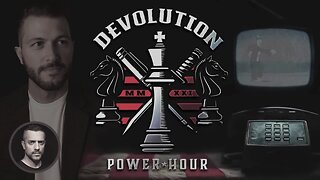 2:02:28
2:02:28
Badlands Media
23 hours agoDevolution Power Hour Ep. 385
38.6K13 -
 1:56:48
1:56:48
Tundra Tactical
2 hours ago $2.80 earnedFull Semi-Auto Comedy Hour
13.5K2 -
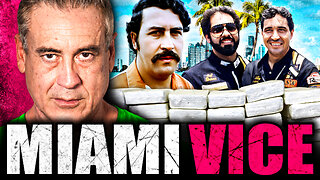 2:07:31
2:07:31
The Connect: With Johnny Mitchell
11 hours ago $1.50 earnedSecrets Of The Cocaine Cowboys: Miami Drug Lord Reveals Truth About His BILLION-DOLLAR Coke Empire
13K -
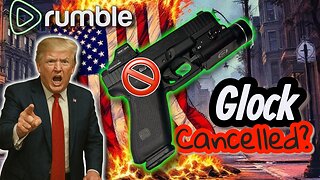 DVR
DVR
BlackDiamondGunsandGear
1 day agoGlocks Want Gun Control? // Trump Tramples on your Rights? // After Hours Armory
12.8K1 -
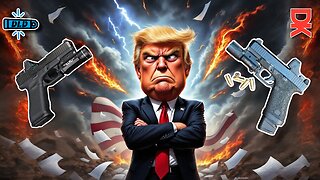 DVR
DVR
DLDAfterDark
7 hours ago $0.76 earnedDLD Live! Trump - Flag Burning - Glock & Gun Control - Martial Law Light?? - After Hours Armory
8.56K -
 LIVE
LIVE
GritsGG
13 hours agoRumble Customs! 3515 Ws! 🫡!
296 watching -
 5:59:47
5:59:47
SpartakusLIVE
8 hours agoThe HUGEST Brain (not forehead) delivers Saturday SPARTOONS || Variety Later - Shadow of Mordor
181K4 -
 2:34:20
2:34:20
Barry Cunningham
9 hours agoPRESIDENT TRUMP WELCOMES FOOTBALL SEASON! AND MORE BREAKING NEWS!
72.6K45 -
 54:47
54:47
Side Scrollers Podcast
13 hours agoSide Scroller Presents KING OF THE KART | MASSIVE MARIO KART TOURNAMENT
41.7K